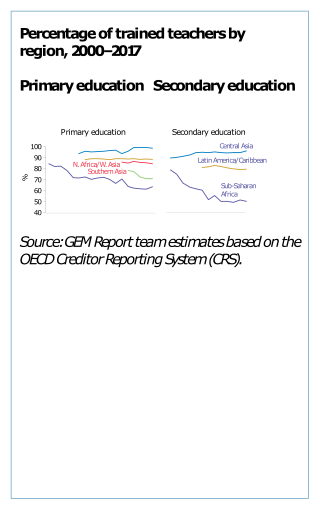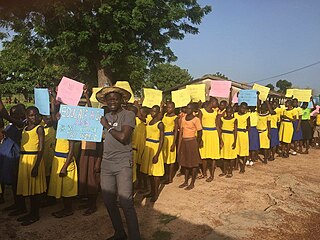
Pedagogy, most commonly understood as the approach to teaching, is the theory and practice of learning, and how this process influences, and is influenced by, the social, political, and psychological development of learners. Pedagogy, taken as an academic discipline, is the study of how knowledge and skills are imparted in an educational context, and it considers the interactions that take place during learning. Both the theory and practice of pedagogy vary greatly as they reflect different social, political, and cultural contexts.
Special education is the practice of educating students in a way that accommodates their individual differences, disabilities, and special needs. This involves the individually planned and systematically monitored arrangement of teaching procedures, adapted equipment and materials, and accessible settings. These interventions are designed to help individuals with special needs achieve a higher level of personal self-sufficiency and success in school and in their community, which may not be available if the student were only given access to a typical classroom education.

In education, a curriculum is the totality of student experiences that occur in an educational process. The term often refers specifically to a planned sequence of instruction, or to a view of the student's experiences in terms of the educator's or school's instructional goals. A curriculum may incorporate the planned interaction of pupils with instructional content, materials, resources, and processes for evaluating the attainment of educational objectives. Curricula are split into several categories: the explicit, the implicit, the excluded, and the extracurricular.
Universal Design for Learning (UDL) is an educational framework based on research in the learning theory, including cognitive neuroscience, that guides the development of flexible learning environments and learning spaces that can accommodate individual learning differences.
Culturally relevant teaching is instruction that takes into account students' cultural differences. Making education culturally relevant is thought to improve academic achievement, but understandings of the construct have developed over time Key characteristics and principles define the term, and research has allowed for the development and sharing of guidelines and associated teaching practices. Although examples of culturally relevant teaching programs exist, implementing it can be challenging.
In education, Response to Intervention is an academic approach used to provide early, systematic, and appropriately intensive supplemental instruction and support to children who are at risk of or currently performing below grade or age level standards. However, to better reflect the transition toward a more comprehensive approach to intervention, there has been a shift in recent years from the terminology referring to RTI to MTSS, which stands for "multi-tiered system of supports". MTSS represents the latest intervention framework that is being implemented to systematically meet the wider needs which influence student learning and performance.

Teacher education or teacher training refers to programs, policies, procedures, and provision designed to equip (prospective) teachers with the knowledge, attitudes, behaviors, approaches, methodologies and skills they require to perform their tasks effectively in the classroom, school, and wider community. The professionals who engage in training the prospective teachers are called teacher educators.

Inclusion in education refers to including all students to equal access to equal opportunities of education and learning, and is distinct from educational equality or educational equity. It arose in the context of special education with an individualized education program or 504 plan, and is built on the notion that it is more effective for students with special needs to have the said mixed experience for them to be more successful in social interactions leading to further success in life. The philosophy behind the implementation of the inclusion model does not prioritize, but still provides for the utilization of special classrooms and special schools for the education of students with disabilities. Inclusive education models are brought into force by educational administrators with the intention of moving away from seclusion models of special education to the fullest extent practical, the idea being that it is to the social benefit of general education students and special education students alike, with the more able students serving as peer models and those less able serving as motivation for general education students to learn empathy.
Special education in the United States enables students with exceptional learning needs to access resources through special education programs. These programs did not always exist. "The idea of excluding students with any disability from public school education can be traced back to 1893, when the Massachusetts Supreme Court expelled a student merely due to poor academic ability". This exclusion would be the basis of education for all individuals with special needs for years to come. In 1954, Brown v. Board of Education sparked the belief that the right to a public education applies to all individuals regardless of race, gender, or disability. Finally, special education programs in the United States were made mandatory in 1975 when the United States Congress passed the Education for All Handicapped Children Act (EAHCA) "(sometimes referred to using the acronyms EAHCA or EHA, or Public Law 94-142) was enacted by the United States Congress in 1975, in response to discriminatory treatment by public educational agencies against students with disabilities." The EAHCA was later modified to strengthen protections to students with disabilities and renamed the Individuals with Disabilities Education Act (IDEA). IDEA requires states to provide special education and related services consistent with federal standards as a condition of receiving federal funds.
English-language learner is a term used in some English-speaking countries such as the United States and Canada to describe a person who is learning the English language and has a native language that is not English. Some educational advocates, especially in the United States, classify these students as non-native English speakers or emergent bilinguals. Various other terms are also used to refer to students who are not proficient in English, such as English as a second language (ESL), English as an additional language (EAL), limited English proficient (LEP), culturally and linguistically diverse (CLD), non-native English speaker, bilingual students, heritage language, emergent bilingual, and language-minority students. The legal term that is used in federal legislation is 'limited English proficient'.

Learning disability, learning disorder, or learning difficulty is a condition in the brain that causes difficulties comprehending or processing information and can be caused by several different factors. Given the "difficulty learning in a typical manner", this does not exclude the ability to learn in a different manner. Therefore, some people can be more accurately described as having a "learning difference", thus avoiding any misconception of being disabled with a possible lack of an ability to learn and possible negative stereotyping. In the United Kingdom, the term "learning disability" generally refers to an intellectual disability, while conditions such as dyslexia and dyspraxia are usually referred to as "learning difficulties".
Twice-exceptional, also known as 2e, is a term used to describe a student who is both gifted and neurodivergent.
Social thinking or thinking socially refers to a methodology created by Michelle Garcia Winner; it is described as a piece we all go through in our minds as we try to make sense of our others’ thoughts, feelings, and intentions in a situation, whether we are merely present, actively interacting, or observing (noticing) what is happening from a distance. Our ability to think socially is part of social learning that begins at birth and evolves across our lifetime. Social thinking in this context is also referred to as social cognition.
Christine E. Sleeter is an American professor and educational reformer. She is known as the Professor Emerita in the School of Professional Studies, California State University, Monterey Bay. She has also served as the Vice President of Division K of the American Educational Research Association, and as president of the National Association for Multicultural Education. Her work primarily focuses on multicultural education, preparation of teachers for culturally diverse schools, and anti-racism. She has been honored for her work as the recipient of the American Educational Research Association Social Justice Award, the Division K Teaching and Teacher Education Legacy Award, the CSU Monterey Bay President's Medal, the Chapman University Paulo Freire Education Project Social Justice Award, and the American Educational Research Association Special Interest Group Multicultural and Multiethnic Education Lifetime Achievement Award.

In the United States, elementary schools are the main point of delivery of primary education, for children between the ages of 4–11 and coming between pre-kindergarten and secondary education.
Positive behavior interventions and supports (PBIS) is a set of ideas and tools used in schools to improve students' behavior. PBIS uses evidence and data-based programs, practices, and strategies to frame behavioral improvement relating to student growth in academic performance, safety, behavior, and establishing and maintaining positive school culture. PBIS tries to address the behavioral needs of at-risk students and the multi-leveled needs of all students, in an effort to create an environment that promotes effective teaching and learning in schools. Educational researchers such as Robert H. Horner believe that PBIS enhances the school staff's time for delivering effective instructions and lessons to all students.
Social justice educational leadership emphasizes the belief that all students can and will reach proficiency, without exceptions or excuses, and that schools ought to be organized to advance the equitable learning of all students. Rather than focusing on one group of students who traditionally struggle, or who traditionally succeed, social justice leaders address the learning needs of all students. Social justice educational leadership specifically addresses how differences in race, income, language, ability, gender, and sexual orientation influence the design and effectiveness of learning environments. Social justice leadership draws from inclusive education practices from disability education, but extends the concepts further to support students from diverse groups with a wide range of needs. Through restructuring staff allocation and assessing student progress through disaggregated data, school leaders strive to create schools with equal access and equitable support for all students.
Curricula in early childhood care and education (ECCE) or early childhood curriculum address the role and importance of curricula in the education of young children, and is the driving force behind any ECCE programme. It is ‘an integral part of the engine that, together with the energy and motivation of staff, provides the momentum that makes programmes live’. It follows therefore that the quality of a programme is greatly influenced by the quality of its curriculum. In early childhood, these may be programmes for children or parents, including health and nutrition interventions and prenatal programmes, as well as centre-based programmes for children.
Inclusive Classroom is a term used within American pedagogy to describe a classroom in which all students, irrespective of their abilities or skills, are welcomed holistically. It is built on the notion that being in a non-segregated classroom will better prepare special-needs students for later life. In the United States, the Rehabilitation Act of 1973 guaranteed civil rights to disabled people, though inclusion of disabled students progressed slowly until the No Child Left Behind Act of 2001, after which almost half of US students with disabilities were soon in general classrooms.
Donna Y. Ford is an American educator, anti-racist, advocate, author and academic. She is a distinguished professor of education and human ecology and a faculty affiliate with the center for Latin American studies in the college of arts and sciences, and the Kirwan Institute in the college of education and human ecology at Ohio State University.





